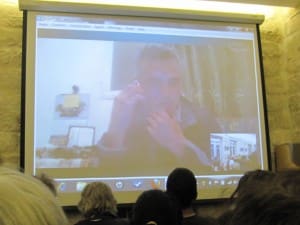I don’t know why I went to watch the Palestinian documentary, “Five Broken Cameras” last night. I was already exhausted from a long, sad week. And I knew that the Educational Bookshop in Jerusalem would be packed and there would be no seat. And I’d see people I was too tired to be polite to. But I went. I don’t know why. My car seemed to drive itself down to Salahadin Street. Then I paid too much to park in a lot. I don’t know why I went. I could have just bought the DVD and watched it at home.
I knew the film would be excellent or it would not have been nominated for an Academy Award. I knew it would be so well done that it would keep me up at night, and here I am, as expected, writing about it at 4 am. I knew it would be too much for me, after writing about Ziad Jilani’s death. Each article I write seems to deplete my being in some way that can’t be replenished. Yet I write, hoping it will save me, but fearing it will kill me. Being in touch with so much pain.
That’s what co-director Emad Burnat meant, I think, when he said in a discussion with the audience by skype, “I wanted to tell my story,” and why he braved, and continues to brave, such violence so that he can continue to film. I sensed it hurt him to document the reality that he, like the rest of the world, would prefer to deny. Yet he was compelled. I think I understand that.

The scenes of the movie were all familiar to me. The children said what they always say. The protesters chanted what they always chant. I watched as children vomited from tear gas, as old people were hit with rubber bullets in the face, as people who we’d come to love through the story died almost on cue. There was no new information. Still, the film affected me. It was a compact presentation of the horror that lasted for years, and continues to this day, from the perspective of one man. A regular man.
The sickness and inhumanity of what is happening in Bil’in, in Palestine, is inescapable.
I did try to escape the film, more than once. I wanted to go home, to my children, and to rest. I was so tired. But I stayed, drawn both by deep sadness and utter awe for the steadfastness of the people of Bil’in, and of Emad Burnat.
I’m sure if you watch the film, you’ll feel it too. And I hope it compels you, and me, to act.
Yes, I’ve seen it too and want to act but feel utterly helpless. They just have to keep going…
And so do we!